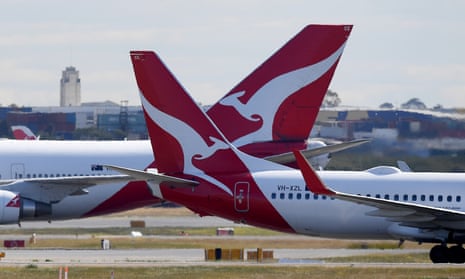Qantas engineers to strike during peak-hour flights
Qantas workers are set to escalate industrial action as aircraft-towing engineers prepare to walk off the job during peak-hour flights to secure better pay, AAP reports.
More than 1,000 engineers will stage walkouts today as union members push for a 15% rise in the first year of a new enterprise agreement, followed by 5% increases in subsequent years.
Flights between 7am and 9am at major airports in Brisbane, Sydney, Canberra, Melbourne, Adelaide and Perth will “likely be affected”, the Qantas Engineers’ Alliance said in a statement yesterday.
A Qantas spokesperson said that over the past four days, “we have seen no disruptions to our network as a result of the industrial action from some of our engineering workgroups.”
We have contingencies in place and don’t expect Monday’s planned strike action to have an impact on customers, or their travel plans.

About 1,100 aircraft maintenance workers, which is about 45% of the airline’s engineers, are covered by the agreement under negotiation. Workers have been in negotiations since April, while their enterprise agreement expired at the end of June.
Qantas made a net profit of $1.25bn in the 2023-24 financial year, down 28% from the previous year.
Key events
Barnaby Joyce continues to tout ‘dangers’ of Chinese EV despite Coalition plan
Nationals MP Barnaby Joyce has again spoken of the “dangers” of Chinese EVs, despite Bridget McKenzie yesterday insisting that banning them in Australia wasn’t the Coalition’s plan.
Speaking on Sunrise earlier this morning, Joyce repeated his argument that China could blow up solar panels and electric vehicles – invoking last week’s Hezbollah members’ pager explosions. Joyce said:
We know with Hezbollah, Israel managed to blow up their pagers, that control of remote devices is certainly part of the new battlefield. We want to make sure Australians are safe, that we clearly disseminate where risks lie.
It is not only that, we also have 200,000 solar panels on the rooftops across Sydney, Melbourne and Brisbane. James Patterson has brought this up in the past. I want to make sure Australians are safe there. It is precautionary.
The host noted that in his example, “this wasn’t China.”
Joyce began responding, “Any malevolent force that has the capacity to do that …”
Host: “Do you think that could happen here?”
Joyce: “I’m not a moron, but I am across the threat that any cogent and proper authority says, then I don’t dismiss it. They know vastly more than I do.”
Chalmers says he got advice on negative gearing changes because it was ‘contentious’
Jim Chalmers was also asked on whether advice from Treasury was sought by himself on negative gearing and capital gains tax changes. He told ABC RN:
I get advice all the time on all the various issues in the economy, including negative gearing, and that’s not especially unusual …
Sometimes the advice comes unprompted, sometimes it’s sought by me. On this occasion, you know, when there’s a contentious issue in the public domain and we’ve got a severe shortage of housing, of course, treasurers get advice from their department on these sorts of issues, and that’s what’s happened here …
I got this advice because it was a contentious issue, it was in the public domain, and it was a big part of the parliamentary debate as well.
Treasurer details budget surplus
Moving now to news of the $15.8bn budget surplus: Jim Chalmers was asked if this is because of under-spending by certain departments, or actual decisions since May to reduce spending?
He responded:
Well, the $80bn in savings are decisions. The spending restraint is a decision, and a substantial amount of the improvement since May is in demand driven programs. There is some under-spending. We’ll detail that when we release all of the figures today …
The improvement from our expectations of the surplus in May to the final budget outcome that we’re reporting today is not about more revenue, it’s not about higher commodity prices, it’s not about more taxes – it’s about the less spending.
Treasurer raised trade restrictions on lobsters with Chinese leaders
Asked about the trade restrictions on Australian lobsters by China, Jim Chalmers said:
We’ve got a bit more work to do on lobster, but I was able to convey directly to Chinese leaders that we want to see the speedy resolution of those issues.
Chalmers says weakness in Chinese economy ‘big concern’ for Australia
Jim Chalmers has just returned from Beijing, where he co-chaired the first Australia-China Strategic Economic Dialogue.
The treasurer said there “couldn’t have been a more important time” to restart the dialogue with China.
It’s a really important part of stabilising the relationship, which is full of complexity and full of economic opportunity. And while I was there, the Chinese authorities announced some quite substantial steps when it comes to supporting growth in the Chinese economy. We’ve made it really clear that weakness in the Chinese economy has been a big concern for us. It’s a big part of the global economic uncertainty that we’re dealing with …
If you look at our Treasury forecasts in the budget, we’re anticipating the weakest few years of Chinese growth, really, since that economy opened up in the late 1970s [and] that’s been a big concern for us. We’ve been upfront about that, so any efforts to try and turn that around in China is a good thing for us.
Chalmers ‘very concerned’ about escalation of conflict in the Middle East
The treasurer, Jim Chalmers, has been speaking with ABC RN.
He was asked how concerned the government is about a broader regional conflict breaking out in the Middle East after an escalation over the weekend, with attacks from Israel on targets in Lebanon and now Yemen. Chalmers responded:
Very concerned. We don’t for one second mourn the death of a leader of a terrorist organisation, but we do mourn the deaths of innocent victims, and too many innocent lives have been lost already, and that’s why we need a ceasefire so that the senseless killing of families stops.
And so our primary concern here is the human cost, but obviously a broader regional war, the escalation of this very troubling regional conflict will have economic consequences as well.

Mostafa Rachwani
Replacement buses begin for T3 train line in Sydney
Henry is one of the first people to take the SouthWest Link train replacement buses, and he’s pretty impressed.
The buses will be running free services from Bankstown to Sydenham for over a year, as the train stations are converted to the Metro line.
The recent migrant from Indonesia said he thought it was “good to see” the number of buses running on the service. Buses were arriving one after another, with services organised to be leaving Bankstown every four minutes.
It’s great, if they can keep it up. It would be very convenient if it stays this consistent over the next year or so.
Lambie backs changes to negative gearing for a maximum of two houses
Jacqui Lambie also spoke in favour of changes to negative gearing, as one of many moves needed to address the housing crisis. She said:
There’s got to be a lot of change if we’re going to put houses on the ground and we’re going to make them more affordable, there’s probably six or eight moves you have to make in this. And I believe negative gearing is one of them. And it should be maximum two houses.
‘Nobody gives a stuff about a surplus’: Jacqui Lambie
Tasmanian senator Jacqui Lambie was on the Today show earlier, and was asked about news the treasurer, Jim Chalmers, will today reveal a $15.8bn budget surplus.
Lambie weighed in on this, and said: “Nobody gives a stuff about a surplus”. She continued:
Mate, I can assure you right now, people are doing it hard out there. Nobody’s talking about a surplus. And if they were, and they truly understood that, we’re saying, ‘well, how about you put some of that surplus out to us, so we can put bread and milk on the table for our kids and do that without raising the inflation.’
You know, surely with a surplus, people are really hurting out there. Honestly, give them more. Find a way to do it.
AMWU head gives more detail on Qantas engineers strike
The national secretary of the Australian Manufacturing Workers Union, Steve Murphy, spoke with Sunrise earlier about the planned industrial action for Qantas engineers today.
Asked why the workers were striking, he said more than 1,000 highly skilled maintenance workers had endured “four years without a wage increase.”
The workers today are out on strike … for two hours. We want Qantas to come to the table and recognise the skill and contribution they make to Qantas’s reputation …
These are the workers that get you there safely. We check the planes to make sure they’re when they take off everything is safe. There is no car park at 30,000 feet. They have to get everything right first time …
Asked about the timing with the beginning of school holidays, Murphy said members “decided this was the most strategic time to put Qantas under pressure”.
They have never been put under pressure like this before. Qantas needs to come to the table and make sure they respect their workers.
Qantas engineers to strike during peak-hour flights
Qantas workers are set to escalate industrial action as aircraft-towing engineers prepare to walk off the job during peak-hour flights to secure better pay, AAP reports.
More than 1,000 engineers will stage walkouts today as union members push for a 15% rise in the first year of a new enterprise agreement, followed by 5% increases in subsequent years.
Flights between 7am and 9am at major airports in Brisbane, Sydney, Canberra, Melbourne, Adelaide and Perth will “likely be affected”, the Qantas Engineers’ Alliance said in a statement yesterday.
A Qantas spokesperson said that over the past four days, “we have seen no disruptions to our network as a result of the industrial action from some of our engineering workgroups.”
We have contingencies in place and don’t expect Monday’s planned strike action to have an impact on customers, or their travel plans.
About 1,100 aircraft maintenance workers, which is about 45% of the airline’s engineers, are covered by the agreement under negotiation. Workers have been in negotiations since April, while their enterprise agreement expired at the end of June.
Qantas made a net profit of $1.25bn in the 2023-24 financial year, down 28% from the previous year.
Bankstown line officially closed for Metro upgrades
As we just flagged, the T3 train line from Bankstown to Sydenham has officially closed for Metro upgrades.
Here are some photos from the scene at Bankstown station, with buses beginning to replace trains ahead of peak-hour traffic:
And in other traffic news, the overnight XPT from Melbourne to Sydney is 50 minutes delayed.
Welcome

Emily Wind
Good morning, and welcome to a new week on the Australia news live blog. I’m Emily Wind, and I’ll be taking you through our live coverage this Monday.
The T3 train line from Bankstown to Sydenham in Sydney has officially closed today for Metro upgrades. We’ll keep an eye on any delays or impacts this morning as peak-hour traffic begins, but in the meantime, Mostafa Rachwani has the latest below:
Meanwhile, Qantas workers are set to escalate industrial action as aircraft-towing engineers prepare to walk off the job during peak-hour flights to secure better pay.
As AAP reports, more than 1,000 engineers will stage walkouts today as union members push for a 15% pay rise in the first year of a new enterprise agreement, followed by 5% increases in subsequent years.
Flights between 7am and 9am at major airports in Brisbane, Sydney, Canberra, Melbourne, Adelaide and Perth will “likely be affected”, the Qantas Engineers’ Alliance said in a statement yesterday.
As always, you can read out with any tips, feedback or questions via X, @emilywindwrites, or you can send me an email: [email protected].
Let’s get started.







